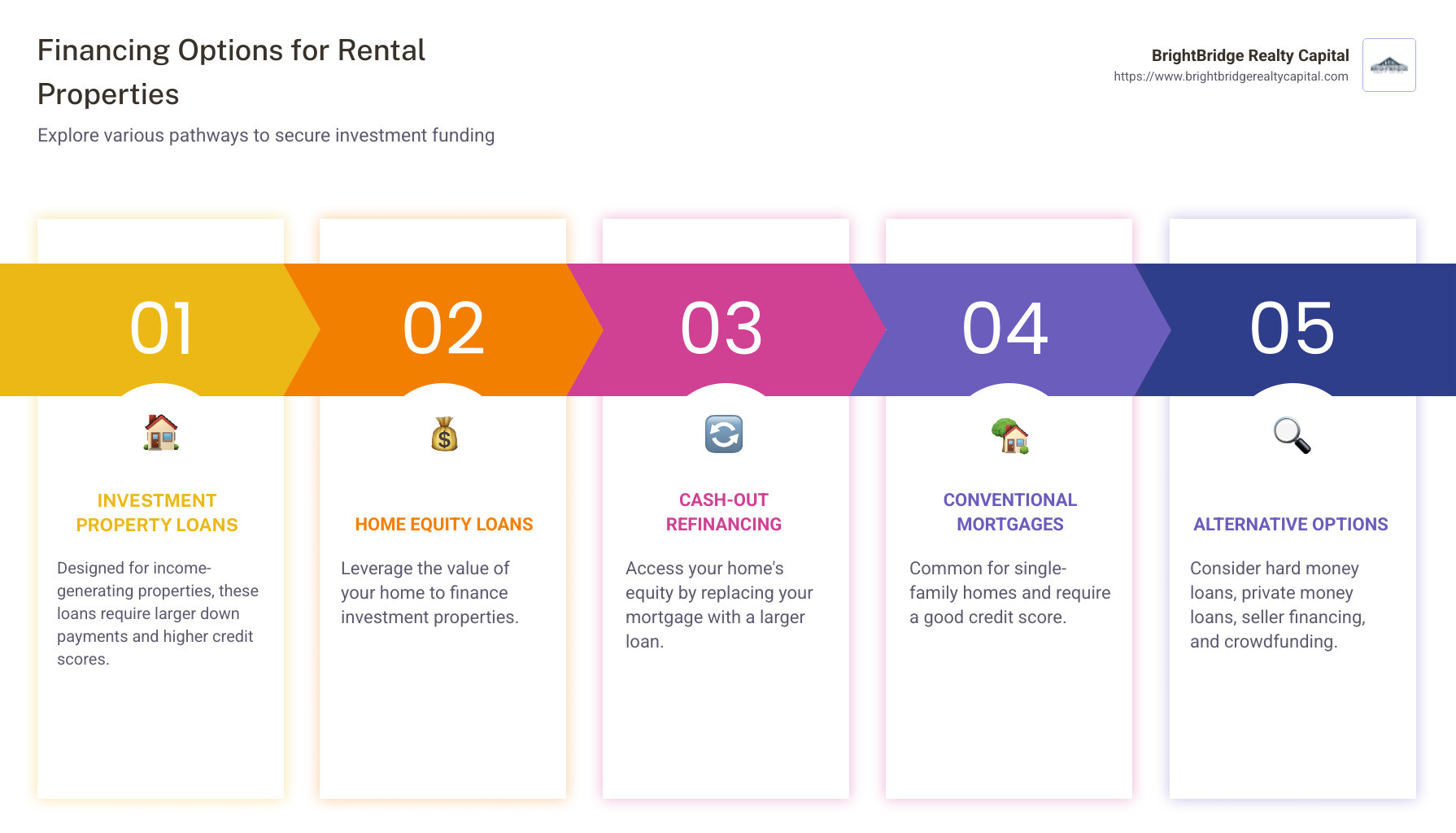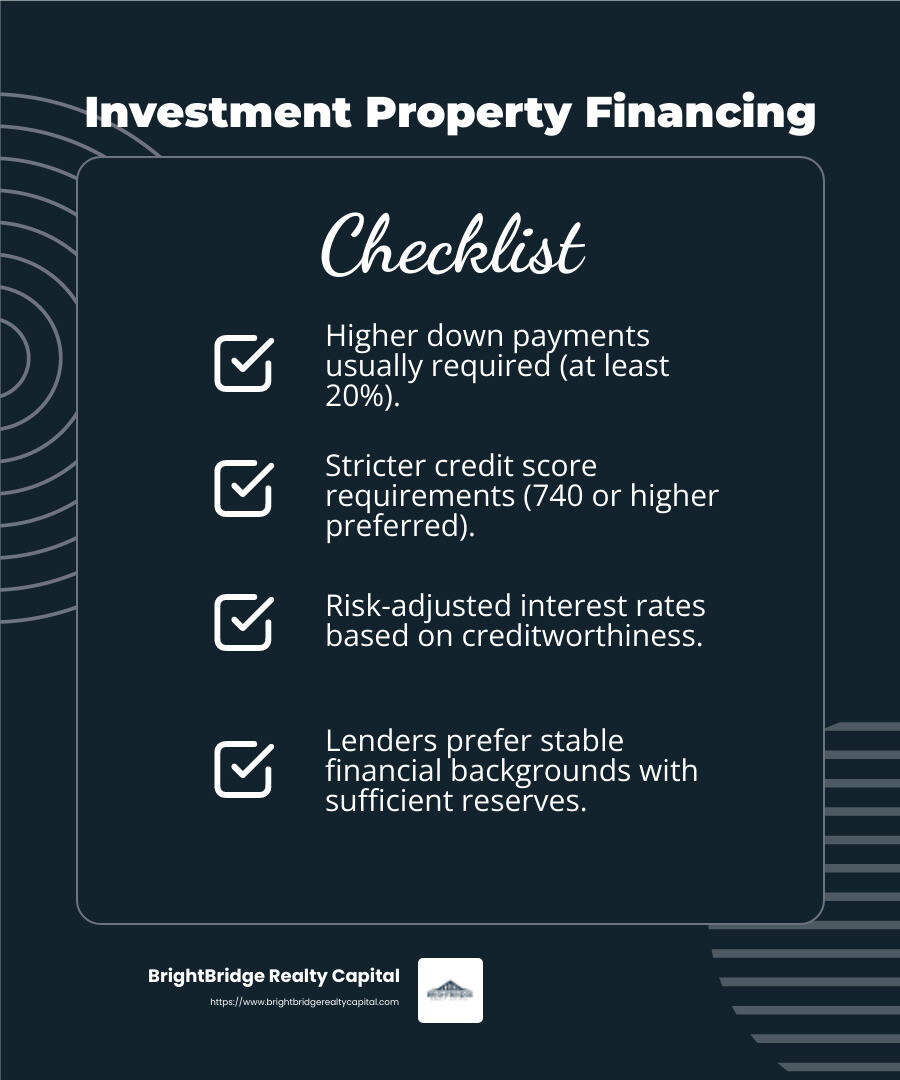From Dream to Reality: Securing Financing for Your Rental Property

How to get financing for a rental property is a pressing question for many aspiring real estate investors. Navigating property investment can seem daunting, especially when it comes to securing the right financing. Fortunately, there are several pathways to explore:
- Investment Property Loans: Designed for properties that generate income, they require larger down payments and higher credit scores.
- Home Equity Loans: Use the value of your current home as leverage for investment.
- Cash-Out Refinancing: Replace your mortgage with a larger one to access equity.
- Conventional Mortgages: Common for single-family homes; require a good credit score.
- Alternative Options: Hard money loans, private money loans, seller financing, and crowdfunding.
In the competitive real estate market, understanding these financing options is crucial. Whether you're eyeing a multi-family home to generate rental income or a single-family residence for long-term investment, knowing the options empowers you to make informed decisions.
In New York, where BrightBridge Realty Capital is based, investors find both challenges and opportunities in the rental market. From friendly neighborhoods to urban centers, the right financing can turn your real estate dreams into reality, helping you build wealth over time.

Know your how to get financing for a rental property terms:
Understanding Investment Property Financing
Securing financing for an investment property is different from getting a loan for your primary home. Higher down payments are typically required. Unlike primary residences, investment properties aren't backed by mortgage insurance, so lenders often ask for at least 20% down. This ensures you have significant equity in the property, reducing the lender's risk.
Additionally, expect stricter credit requirements. To qualify for the best interest rates, a credit score of 740 or higher is ideal. Scores below this threshold may result in additional fees to maintain the same interest rate, or you might face higher rates altogether. Lenders also prefer borrowers with a stable financial background, including sufficient reserves to cover expenses for several months.

Risk-adjusted interest rates are another factor to consider. Investment properties are seen as riskier than primary homes, so lenders compensate with higher interest rates. This means your monthly payments could be higher, affecting your overall return on investment.
For those looking to finance a rental property, understanding these factors is key. By preparing for larger down payments, maintaining a strong credit score, and being aware of potential interest rate increases, you can position yourself better in the competitive market.
In the next section, we'll dive into the specifics of how to get financing for a rental property, exploring various mortgage options and what they entail.
How to Get Financing for a Rental Property
When you're aiming to secure financing for a rental property, you'll encounter several options. Each comes with its own set of requirements and benefits. Let's break down the main types: conventional mortgages, hard money loans, private money loans, and home equity loans.
Conventional Mortgages
Conventional mortgages are the most common route for financing rental properties. They are typically offered by banks and follow guidelines set by Fannie Mae and Freddie Mac. Here’s what you need to know:
Credit Score: A higher credit score is crucial. Aim for a score of 740 or above to get the best interest rates. If your score is below this, you might face higher rates or have to pay extra fees to keep the same rate.
Down Payment: Expect to put down at least 20%. This is because mortgage insurance doesn't cover investment properties, and lenders want to minimize their risk. If you can manage a 25% down payment, you might qualify for even better rates.
Interest Rates: These are generally higher for investment properties compared to primary residences. The reason? Lenders see rental properties as riskier investments.
Alternative Financing Options
If conventional mortgages aren't the right fit, consider these alternative financing options:
Hard Money Loans: These are short-term loans typically used by real estate investors for quick property flips. They have higher interest rates but offer fast approval and flexible terms. Hard money loans are based more on the property's value than your credit score, making them a viable option if you have less-than-perfect credit.
Private Money Loans: These come from private individuals or groups, often within your personal network. They offer flexibility in terms, but be cautious. Mixing personal relationships with financial transactions can be tricky.
Home Equity Loans: If you have significant equity in your primary home, you might use a home equity loan or a home equity line of credit (HELOC) to finance a rental property. This can be a cost-effective option since these loans often have lower interest rates. However, they come with the risk of foreclosure if you default, as your primary home is used as collateral.

Choosing the right financing option depends on your financial situation and investment goals. Whether you opt for conventional mortgages or explore alternative routes, understanding the requirements and risks involved is key.
In the next section, we'll explore creative financing strategies that can help you secure funding even in challenging situations.
Creative Financing Strategies
When traditional financing options like conventional mortgages or hard money loans aren't suitable, creative financing strategies can offer alternative paths to securing funds for your rental property. Let's explore three innovative approaches: seller financing, crowdfunding, and syndicates.
Seller Financing
Seller financing is a unique method where the property seller acts as the lender. Instead of going through a bank, you make installment payments directly to the seller. This can be a win-win situation:
- Flexibility: Buyers who might not qualify for traditional loans due to credit issues can still purchase a property.
- Speed: Transactions can move faster since there's no bank approval process.
- Negotiable Terms: Interest rates and payment schedules can be negotiated directly with the seller.
However, be cautious. Seller financing comes with risks like potential buyer default and fewer consumer protections compared to conventional loans. Legal counsel is often necessary to draft agreements, which can be costly.
Crowdfunding
Crowdfunding allows multiple investors to pool resources to fund real estate projects. This approach is particularly appealing for those with limited capital:
- Access to Larger Projects: By pooling funds, you can invest in larger properties that would otherwise be out of reach.
- Diversification: Spread your investment across different projects, reducing risk.
- Minimal Credit Requirements: Many platforms have lower credit requirements, making it accessible for newer investors.
Though, that crowdfunding often requires sharing control with other investors and involves management or advisory fees. It's crucial to research each platform thoroughly to understand their terms and potential returns.
Syndicates
Syndicates involve forming a group of investors to purchase real estate. These are more structured than crowdfunding and require a sponsor to manage the investment:
- Professional Management: A sponsor identifies properties, manages the investment, and distributes returns.
- Regulation: Syndicates must be registered legal entities, regulated by the U.S. Securities and Exchange Commission.
- Resource Pooling: Allows participation in larger investments with shared risk.
Due to the complexity and regulatory requirements, syndicates are best suited for experienced investors with substantial resources.

By considering creative financing strategies like seller financing, crowdfunding, and syndicates, you can overcome traditional barriers and secure funding for your rental property. In the next section, we'll address frequently asked questions about rental property financing to further guide your investment journey.
Frequently Asked Questions about Rental Property Financing
What type of loan is best for investment property?
When it comes to investment properties, choosing the right loan can significantly impact your success. Here are some popular options:
Conventional Mortgages: These are the go-to for many investors. They require higher credit scores and larger down payments but offer competitive interest rates. They’re ideal for those with solid credit and sufficient cash reserves.
Home Equity Loans: If you own a home with equity, you can use it to finance a rental property. This can be a smart move if you want to keep your existing mortgage rate and need a lump sum for your investment.
Hard Money Loans: Suitable for short-term investments like fix-and-flip properties. They have higher interest rates but are easier to qualify for, making them a quick option for those who need fast cash.
Each loan type has its pros and cons, so it’s essential to evaluate your financial situation and investment goals before deciding.
How to get a loan for a rental property with no money down?
Getting a loan for a rental property with no money down can be challenging, but not impossible. Here are some strategies:
VA Loans: If you’re a veteran, you may qualify for a VA loan with no down payment, provided you occupy one of the units.
Seller Financing: Negotiate with the seller to finance the property purchase. This can eliminate the need for a down payment if the seller agrees to favorable terms.
Partnerships: Team up with investors who can provide the down payment in exchange for a share of the profits or equity.
Lease Options: Agree to lease the property with an option to buy later. This allows you to use rental income toward the purchase price.
These strategies require careful planning and negotiation, but they can help you acquire property without a large upfront investment.
What are the investment property loan requirements?
Securing a loan for an investment property involves meeting specific loan requirements:
Credit Score: A higher credit score is crucial. Lenders typically look for scores of 620 or above, but higher scores can get you better terms.
Down Payment: Expect to put down at least 15-20% for single-unit properties. Multifamily homes may require even more.
Income and Reserves: Lenders want to see proof of stable income and reserves to cover months of mortgage payments in case of income loss.
Property Appraisal: An appraisal will be necessary to determine the property’s value and potential rental income.
Understanding these requirements can help you prepare and increase your chances of loan approval. In the next section, we’ll explore more about BrightBridge Realty Capital’s custom solutions and how they can help you achieve your investment goals.
Conclusion
When it comes to securing financing for a rental property, choosing the right partner can make all the difference. At BrightBridge Realty Capital, we pride ourselves on offering customized solutions that cater specifically to your investment needs. Whether you're a seasoned investor or just starting, our approach is designed to provide you with the flexibility and speed necessary to seize opportunities as they arise.
Why Choose BrightBridge Realty Capital?
Customized Solutions: We understand that every investor's strategy is unique. That's why we offer custom loan options that align with your specific goals. Whether you're financing a fix-and-flip project or expanding your rental portfolio, we have the right solution for you.
Fast Closings: Time is of the essence in real estate. Our fast closing process—often within a week—ensures you can move quickly and effectively, without the typical delays associated with traditional lenders.
Direct Lending: By cutting out intermediaries, we offer competitive rates and a seamless process. This direct approach not only saves you money but also simplifies the borrowing experience.
Nationwide Reach: No matter where your investment properties are located, our nationwide services ensure you have access to the capital you need.
Investing in real estate is a journey, and having the right financial partner can turn your dreams into reality. Let us help you steer the complexities of rental property financing with ease and confidence.
Ready to take the next step? Explore our loan options and find how BrightBridge Realty Capital can support your investment journey.


